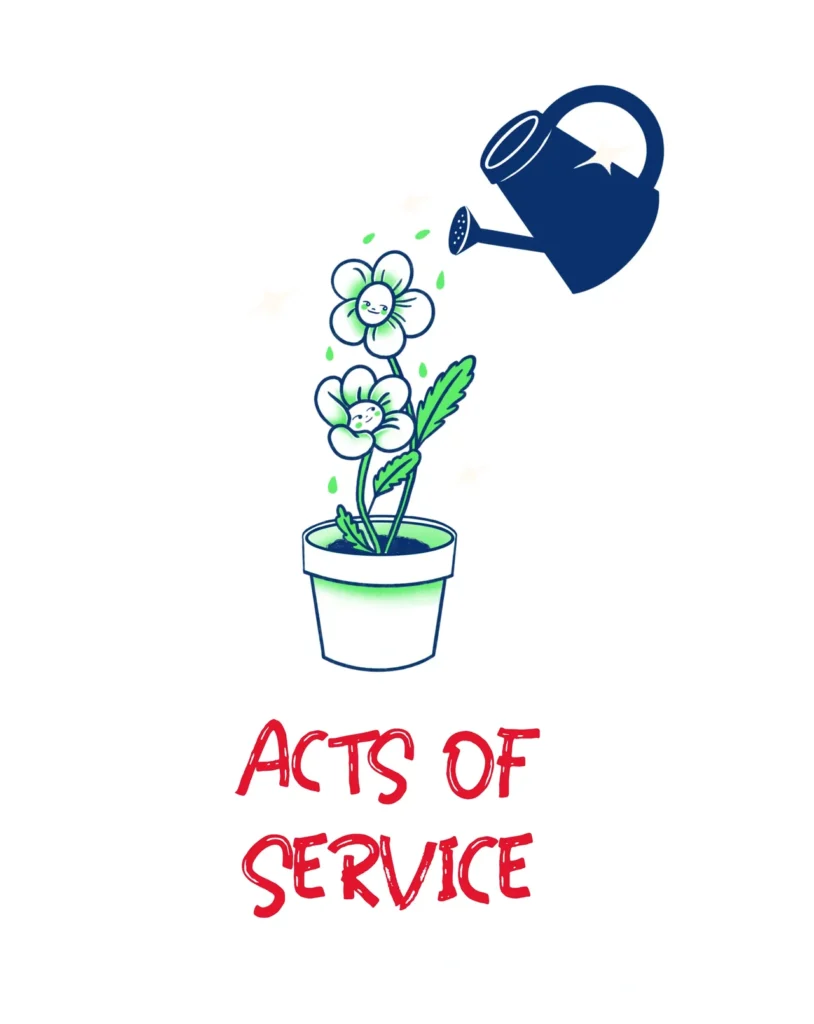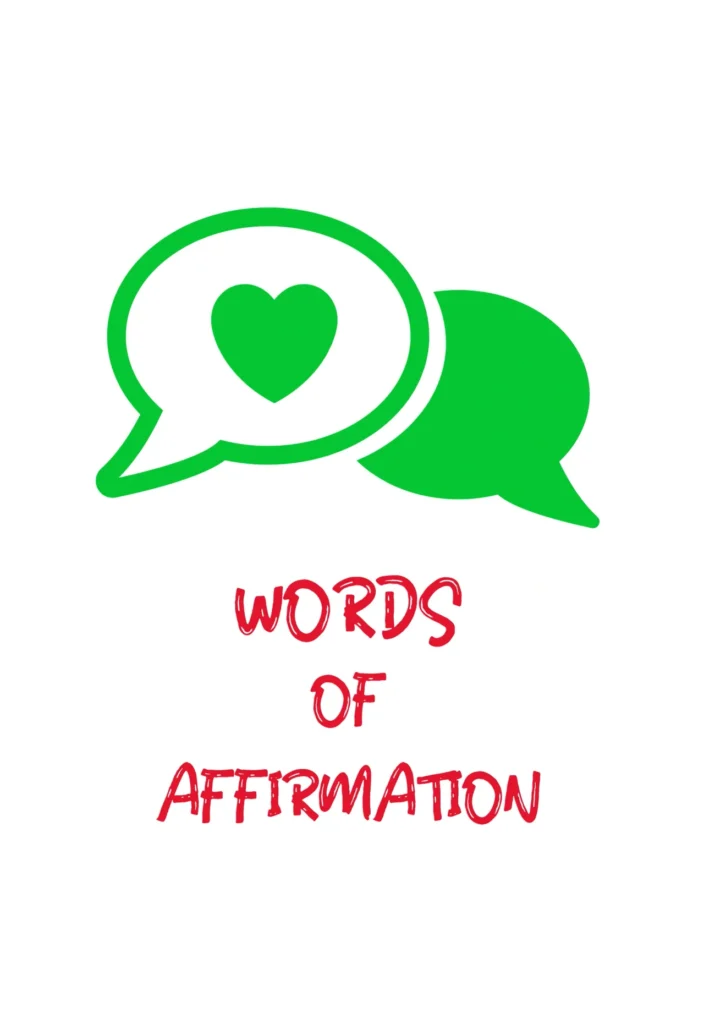
What are love languages?
The idea of the 5 love languages was coined by marriage counselor, speaker, and author, Dr. Gary Chapman. Through his research, Dr. Chapman discovered that everyone both gives and receives love best in the following ways:
1. Acts of Service
2. Physical Touch
3. Receiving Gifts
4. Quality Time
5. Words of Affirmation
Understanding your love language is key in developing and maintaining healthy relationships.
While this concept was developed specifically with romantic relationships in mind, it can be applied to any relationship: romantic, platonic, or familial.
While it’s important to learn and understand your love language, it’s just as important for you to know your loved ones’ love languages. Anytime you feel a strain in one of your relationships, maybe take a look at both of your languages to see if that’s where something is lacking. What need isn’t being met? Is your loved one putting in effort, but not the kind of effort that makes you feel valued? Why is that?
It’s also important to understand not only how you and your loved ones prefer to receive love, but how you show your love as well because they aren’t always the same.
If your loved one feels especially hurt by something that didn’t seem like a big deal to you, maybe it’s because you defied their primary love language.
The best way to learn your loved ones’ love languages is to just ask them. Have an open, honest conversation expressing what you find most meaningful in a relationship and have them do the same. After all, communication is crucial in any kind of relationship, and learning your loved ones’ love languages will only make your relationship stronger.
So, how do I figure out my love language?
Simple!
5 Love Languages has a quick and easy quiz you can take on their website that will assess what you find most meaningful in relationships.
Based on your answers, they’ll give you a percentage of how much each love language applies to you. Notice I say percentage, because even if you relate most with the language that scored the highest, you can still love and appreciate all of the languages in their own way, depending on the situation or relationship.
Your love language can also change and evolve over time, just as you do. So, if you’ve taken the quiz before but it’s been a few years, it wouldn’t hurt to give it another go!
Also, just like any quiz you take on the internet, you don’t want to base your entire perception solely on those results. Do your own research on each love language, so you can make the final call on which one you feel you relate most with.
To give you a head start, we’ve outlined a basic overview of each love language below, as well as what you can do to support those you love with that love language.
Acts of Service

For those whose primary love language is acts of service, actions speak louder than words.
They love it when their loved ones do something for them that helps ease their burden of responsibility. This can be as simple as making dinner for your partner to come home to after work or doing household chores for your roommate like dishes or taking out the trash so they don’t have to.
They love it when you take the initiative without being asked.
This shows that you’re paying attention to their needs, and that you care enough about their well-being to lend a hand by your own volition. While those whose love language is acts of service oftentimes struggle with asking for help, if they do ask you for a favor or to run an errand for them, usually it’s not out of laziness or because it’s easier for them to have you do it. It’s because they may need a little affirmation of your love, and they are especially hurt when you don’t follow through with a promise or when they ask you to do something.
Little acts of kindness and gestures go a long way, and they will always appreciate you going the extra mile to make their days a little easier.
Physical Touch

Now, physical touch doesn’t inherently mean anything sexual.
Those with this love language just need physical affection. They’re usually pretty touchy – shocker!
A tender embrace, holding your hand in public (or in private, if they aren’t a fan of PDA), or even a literal pat on the back will go a long way with those who value physical touch.
People whose primary love language is physical touch probably don’t fare well with maintaining long distance relationships. They need their loved ones to be in the same vicinity as them, and any act of physical or threatening violence (while never okay towards anyone) is especially detrimental for them.
Those with this love language view physical touch not only as a sense of connection, but also security.
They like to physically feel your presence and be reassured that you’re really there. They crave physical intimacy, and all they want is to be close to you.
Receiving Gifts

Those whose primary love language is giving/receiving gifts often get a bad rap. They can be seen as too materialistic.
What people don’t understand is that it’s not about the physical gift itself, but rather the thought and effort that is put into the gift.
It’s the gesture that matters most.
For example, you don’t have to spend hundreds of dollars on a fancy Gucci handbag. Stopping on your way home from work to pick up their favorite flower, or going back into the bookstore to buy that book they’d carried around for an hour before talking themselves out of getting, will mean the world to them.
These gifts show that you pay attention to the details about your loved one, and a little can go a long way. Those with this primary love language are hurt most when you forget a special occasion like a birthday or anniversary, or if you give them a gift that’s hastily thrown together at the last minute with no thought whatsoever.
And yes, that could even mean a thousand-dollar Gucci handbag that you didn’t even care enough to consider if they had actually wanted it.
To them, gifts are a visible representation of love, and the less effort you put into them, the less valued they feel.
Quality Time

Now, quality time doesn’t mean just being in the same room together.
For example, maybe your partner or roommate may feel frustrated with you because they feel like you never spend any time together even though you live together, and you just can’t understand why.
But that’s because quality time means intentional time that you’re spending together giving them your undivided attention.
No phones. No distractions. They value quality activities and conversation.
That doesn’t mean making small talk about the weather between the fifteen second interval while Netflix is loading your next episode, okay? While watching a TV show or movie together may be a part of your bonding, they may need a little bit more in order to feel that connection with you.
Those who have this love language are especially hurt by canceled plans or when those they love aren’t listening to them. The quickest way to make your loved one angry is by pulling out your phone during the middle of a conversation.
While it may not seem like a big deal to you, when you do this, you’re showing your loved one that you don’t value their time. That whatever is on your phone is more important than them.
Depending on the individual, quality time could mean that only spending time together one-on-one would fulfill their need. Others don’t mind if it’s in a group setting, just as long as you’re there giving them some of your time and attention.
Words of Affirmation

Those with this primary love language thrive off unsolicited compliments and encouragements.
Keyword being unsolicited. They don’t want to have to ask you to affirm them.
Shower them with compliments, the deeper and more personal the better. They want you to compliment their very being, not just their looks or talents.
This shows them that you notice and understand them. You’re showing them how they look from your point of view.
Now, you don’t have to write a fourteen-page handwritten letter expressing your unyielding love and admiration (although, someone with this love language would probably bask in and appreciate every word).
Sending a quick (or long and meaningful) text with a sincere compliment or words of encouragement would mean the world to them. You could even leave little hand-written notes scattered throughout your house or apartment for them to find throughout the day.
Just little words of encouragement to show them that you care.
Those with this love language are especially hurt by deep-rooted insults. The same words that brought them up could just as easily tear them down.
Words aren’t just words to them. They are how they view and express their love.
Want to learn more?
You can visit the 5 love languages website for more resources and information on each love language.
Dr. Chapman has since expanded on his original concept by writing a plethora of new books that specify the love languages even more, such as “The 5 Apology Languages,” “The 5 Love Languages for Men,” and “The 5 Love Languages: Singles Edition.”
You can also just start paying more attention to yourself and those around you.
How do you and your loved ones show you care for one another? What makes you feel most seen and valued? It’s all a learning curve, and these love languages will help you build an even better foundation with loved ones so you can keep and maintain happy and healthy relationships.

